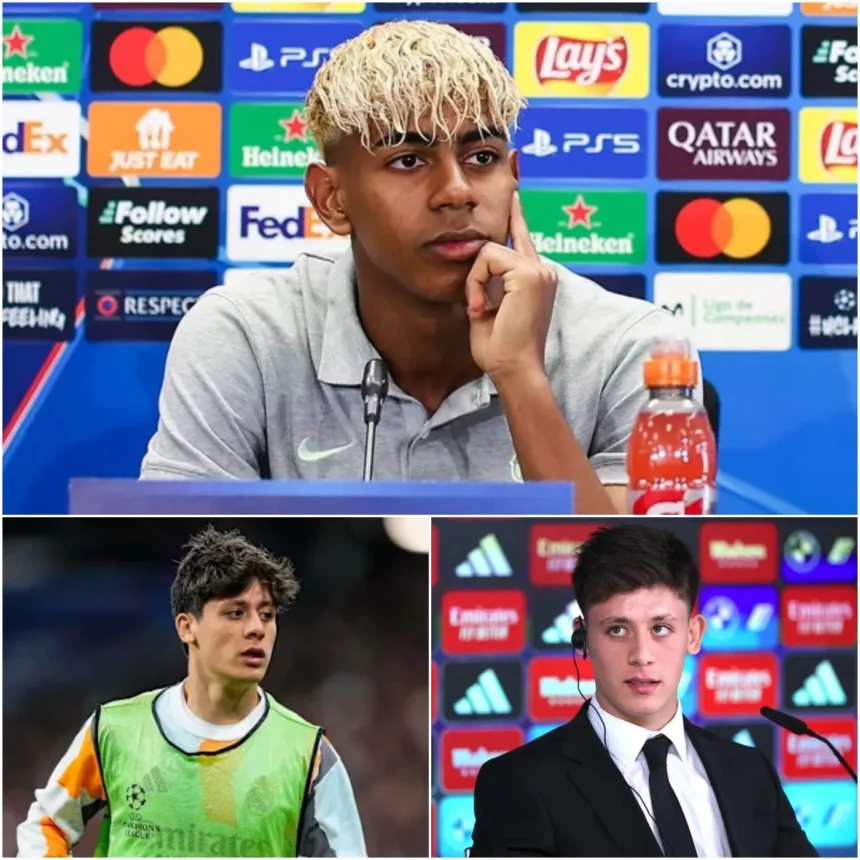Spanish football is once again engulfed in flames after a dramatic war of words between Barcelona’s teenage prodigy Lamine Yamal and a rising Real Madrid talent. What began as a few heated comments after a training session has exploded into one of the most controversial football stories of the year, reigniting the eternal fire of El Clásico.
At just 17, Yamal has already established himself as one of Barcelona’s most promising stars and a player with the courage to speak his mind. But this time, his words have created a storm that extends far beyond the pitch. Speaking to reporters, Yamal accused Real Madrid of building their recent success not purely on footballing merit, but through what he called “FIFA favoritism and luck.” His statement instantly became headline news across Spain.
“It’s not just about talent or hard work,” Yamal declared. “Some clubs always seem to get decisions, calls, and circumstances that go in their favor. You see it in La Liga, you see it in the Champions League—it’s obvious.” When asked directly if he was referring to Real Madrid, the young forward smirked and said, “Everybody knows who I mean.”
The reaction was immediate and ferocious. Real Madrid supporters denounced the comments as nothing more than jealousy, arguing that Los Blancos have proven themselves time and time again on the biggest stages. They pointed to historic comebacks, legendary Champions League nights, and the resilience of Madrid’s stars as evidence that their success comes from quality, not favoritism.
But the controversy took an even sharper turn when one of Real Madrid’s own rising youngsters decided to respond. Hours after Yamal’s comments went viral, the Madrid talent delivered a short yet devastating nine-word reply in an interview: “Excuses are for losers; champions write their own history.” The phrase spread like wildfire across social media, quickly becoming a trending hashtag and dividing fans even further.
For Madridistas, the retort was a perfect counterpunch—concise, confident, and reflective of their club’s mentality. For Barcelona fans, however, it was seen as arrogance from a youngster who should show more respect, especially toward a fellow teenager in Yamal. The rivalry, already fierce, was pushed into overdrive.
The Spanish press wasted no time in dissecting the fallout. Some commentators praised Yamal for his boldness, calling him a voice unafraid to expose the darker side of football politics. Others criticized him as reckless, warning that such comments could damage his reputation at such an early stage in his career. Similarly, Madrid’s youngster was hailed by some as embodying the club’s winning spirit, while others argued that he had poured gasoline on an already raging fire.
Barcelona’s management has remained silent, refusing to publicly support or condemn their teenage star’s words. Sources inside the club, however, suggest that his remarks have unsettled some within the dressing room, who fear that such controversies could prove distracting before a crucial run of fixtures. Real Madrid, meanwhile, issued a calm statement emphasizing their commitment to fair play and tradition, sidestepping the accusations while reinforcing their image as a club that lets results speak for themselves.
Amid the chaos, one question dominates discussion: is there any truth to Yamal’s claims? Critics argue that refereeing mistakes and controversial decisions have long been part of football, affecting all clubs in one way or another. Yet others note that Real Madrid has benefited from several high-profile calls in recent years, fueling perceptions—fair or not—that fortune favors Los Blancos.
The timing of the scandal could not be more explosive. With El Clásico approaching, every comment, every referee’s whistle, and every gesture on the pitch will be interpreted through the lens of this controversy. The rivalry has always been political, cultural, and deeply emotional, but Yamal’s accusations and Madrid’s biting response have added a fresh layer of tension.
For Yamal, this could either be the beginning of a defining moment in his young career—or a costly mistake that paints him as reckless. For Madrid’s youngster, the nine-word response has elevated him to cult status among his fans, but also made him a target in future encounters with Barcelona.
One thing is certain: Spanish football has been handed a scandal that guarantees the next Clásico will be played under the hottest spotlight imaginable. Every pass, every foul, and every referee’s call will be dissected endlessly. And in a rivalry built on pride, history, and controversy, this chapter may go down as one of the most explosive in recent memory.



